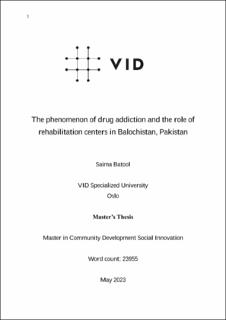| dc.description.abstract | The phenomenon of drug addiction is prevailing universally, and Pakistan is in alarming situation due this problem. This study is mainly concerned with phenomena of drug addiction and the role of rehabilitation centers in Balochistan, Pakistan. As the study required a detailed understanding about drug abuse and the role of rehabilitation centers in Balochistan in recovery of affected individuals. Background and context of Pakistan and its province, Balochistan is focused because of the problem and the role of rehab centers, at some extend depends on its geography, surrounding, and circumstances. It uses a qualitative approach and demonstrates the phenomenon including the real experiences of affected individuals and the people working in rehabilitation centers. Further, it is focused on finding the experiences and strategies on how to help the individuals come out of this problem. It uses in-depth interviews with five staff members of the rehab centers and nine affected individuals admitted there who were purposively selected from four different rehab centers. The empirical data is coded and created into different meaningful themes and analytically presented under those themes. Moreover, the findings are discussed with reference to the related literature in its scope and theoretical bases of cognitive dissonance theory (CDT), and social learning theory (SLT).
The study presents the causes of increasing ratio of drug addiction such as peer groups, unintentional family mistakes and family problems, increasing the sexual capabilities, financial status, educational background, accessibility of drugs, mobilization and mental stress, depression and break ups. It presents the policies and strategies of treatment phases applied by rehab centers like detoxification phase, psychological phase, social phase and spiritual phase. Further, it focuses the type of recovery as long-term and short-term recovery and highlights the ratio and causes of relapse. The study emphasizes the involvement of society, family, and other factors in recovery of the affected individuals and prevention of relapse. It discusses the challenges like socio-cultural barriers, socio-economic, problems, lack of family support, illiteracy, lack of government support, lack of professional staff and unwillingness of the patients. It emphasizes that the rehab centers are doing their best but cannot give satisfactory result without the cooperation of society, family, and government. Female effected individuals are deprived of availing the facilities of rehabilitation centers and get recovered through the help of treatment and professionals due to cultural norms and male dominated society in Pakistan. Recommendations from the study include control of production and supply of drugs, drug awareness programs in educational organizations, psychological sessions with parents and children, balanced family behavior, social awareness about the harms of drugs, extra-curricular activities and sports programs, separate rehab centers for female individuals, finial support from government, hiring of professional staff in rehab centers and conduct further research about this topic. | en_US |
